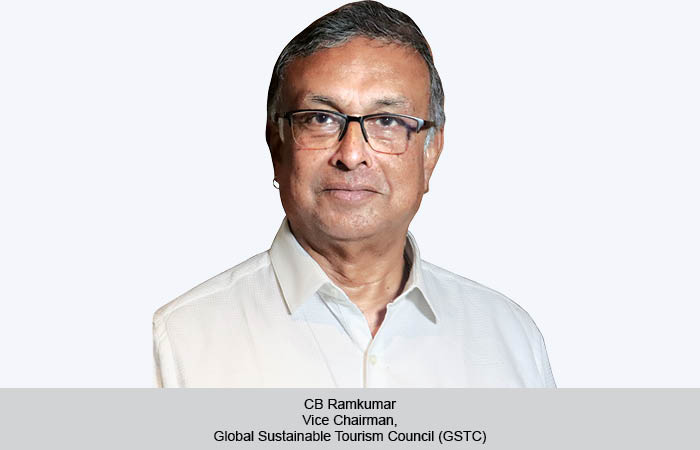CB Ramkumar, Vice Chairman, Global Sustainable Tourism Council (GSTC), sheds light on the critical role of sustainability certification in hospitality. According to his vision for sustainable tourism, clear certification, transparency, and authentic efforts are key to creating a truly sustainable tourism industry.
Surbhi Sharma
As an advocate of sustainable tourism practices worldwide, CB Ramkumar, Vice Chairman, Global Sustainable Tourism Council (GSTC), highlights the vital difference between greenwashing and genuine sustainable practices, the importance of GSTC accreditation, and how sustainability certification is becoming a key criterion for foreign travellers booking a hotel.
In the early days of sustainability, hotels would implement eco-friendly practices with genuine passion, Ramkumar explains. “They would proudly inform guests about rainwater harvesting, waste management, or using local materials. These actions were authentic, driven by a real desire to conserve resources.” However, as sustainability gained attention, many hotels began to engage in greenwashing—superficial gestures like switching to LED bulbs or placing a towel reuse note in the bathroom and calling themselves an eco-resort. “Some hotels even chase awards for sustainability with little real effort. It is laughable,” said Ramkumar. But, with today’s savvy consumers, this facade quickly falls apart. “Consumers are fed up with false claims. They visit a so-called eco-hotel, only to realise the green claims are far from reality. Bad reviews follow, and trust is lost,” he added.
This is where third-party certification plays a crucial role. A verified, GSTC-accredited certification ensures that sustainability claims are real, making it easier for consumers to trust their choices. “Certification is not just a badge; it is a tool for hotels to prove their efforts and stand out in an increasingly eco-conscious market,” he emphasised.
Today, sustainability is not just about environment, it is also about sustainability management, social sustainability and cultural sustainability. The socio-economic issues, the cultural issues, especially in tourism, have become important to ensure that the tourism business continues to be robust, and sustainable. It is a risk mitigation where one reduces all the risks to ensure that there is no interruption in business at all, he noted.
GSTC certification criteria
Achieving GSTC certification is no easy feat. OTAs, such as Booking.com and Agoda, prioritise certified hotels, which results in better visibility and more bookings. Ramkumar describes the rigorous process hotels must undergo, beginning with certification bodies that must themselves be accredited by the GSTC.
“We ensure that certification bodies have the resources, knowledge, and processes in place to certify hotels to GSTC standards,” he says.
Importantly, GSTC certification bodies are prohibited from offering consulting or coaching to avoid conflicts of interest. “Certification must remain unbiased and impartial,” he asserts. Hotels can trust that a GSTC-accredited certification body will assess them rigorously, offering an assurance of true sustainability.
What travellers want?
Post-pandemic, travellers have developed a newfound appreciation for authentic experiences. “The global shift toward organic living, open-air environments, and nature is driving demand for sustainable travel options,” said Ramkumar.
Research from major travel platforms, like Booking.com, confirms that travellers are actively seeking out sustainable accommodations.
“They want to avoid the traps of greenwashing. Authenticity matters, and they are willing to pay more for verified sustainable stays,” he added.
 TravTalk India Online Magazine
TravTalk India Online Magazine





